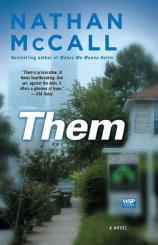Them
Review
Them
Barlowe Reed thought he had a pretty comfortable life. Living
in Atlanta's historically black Old Fourth Ward (home to the
birthplace of Dr. Martin Luther King, Jr.), Barlowe, a skilled
printer, has an easygoing relationship with his neighbors and his
job. Maybe he spends a little too much time keeping an eye on his
troublesome nephew Tyrone, who shares the rundown rental home on
Randolph Street. Maybe he can't find a woman who pleases him as
much as his ex-girlfriend Nell, who was as passionate in bed as she
was in arguments. Maybe he wishes he owned that house on Randolph
Street, if only he could come up with a down payment. As he turns
40, Barlowe discovers that these small annoyances begin to
preoccupy him more and more.
But it's only when new neighbors move into the house next door that
Barlowe begins to really look at himself, his neighborhood and his
role in the community in a new --- and often troubling --- way. The
Gilmores, Sean and Sandy, are white, one of a handful of white
couples who are moving into classic homes in the Old Fourth Ward
based on realtors' promises of "'awesome potential, and marvelous
skyline views.'"
Barlowe, for his part, can't figure out why these white folks are
moving back to the city in droves: "He hadn't yet figured out what
to make of them moving into the Old Fourth Ward. Last he heard
they'd vacated the cities and fled to the woods. He thought they
were happy out there. Now it appeared they'd changed their minds.
White folks… Crazy as they ever wanna be."
For their part, Sean and Sandy move to the overwhelmingly African
American neighborhood not only because their new house is a steal
but also to make a statement. Sandy, a lifelong activist, is always
looking for a chance to stick it to her conservative father, and
his dire predictions for their new neighborhood seal the deal for
her. As for Sean, he's more or less along for the ride, happy to
support Sandy initially but eventually growing more and more uneasy
with the characters he sees in their new neighborhood.
All of a sudden, the drunks, loafers and old men who populate the
public spaces of the Old Fourth Ward are transformed from eccentric
but harmless characters into potential threats to the
neighborhood's newest inhabitants. Police are summoned,
neighborhood institutions are shuttered forever, and ordinary
interactions become opportunities for conflict and even violence.
As Barlowe and Sandy develop an uneasy friendship of sorts as they
speak across the fence that divides their adjoining yards, their
neighborhood and its inhabitants seem to deny every possibility
that two neighbors --- one black, one white --- might ever see
eye-to-eye.
In THEM, his debut novel (and his second book, following his
bestselling memoir MAKES ME WANNA HOLLER), Nathan McCall exposes
the ugly realities of the gentrification trend in today's urban
neighborhoods. Although the book is infused with the flavor and
character of Atlanta's Old Fourth Ward (a place that is virtually a
character in and of itself), the ideas he presents here could be
applied to countless other historic neighborhoods in cities across
the country. And McCall does present some big ideas, in prose that
is almost compulsively quotable, that begs to be read aloud and to
spark discussion. That is not to say that THEM is preachy ---
instead, its sociological and political commentaries grow out of
McCall's grounded, realistic portrayals of flesh-and-blood people
and places, making them feel even more genuine and relevant.
Reviewed by Norah Piehl on January 23, 2011
Them
- Publication Date: August 19, 2008
- Genres: Fiction
- Paperback: 368 pages
- Publisher: Washington Square Press
- ISBN-10: 1416549161
- ISBN-13: 9781416549161




